AI in Japan: Marketers Are Unlocking Efficiency, Results, and Career Growth
A survey of 500 Japanese marketers reveals how teams are benefiting from AI
AI is changing everything. The way people work, what customers demand, and how much individuals can achieve. But how are AI tools actually being used in workplaces today?
Globally, the use of AI tools is expanding rapidly. In Japan, however, adoption remains relatively slow. According to the Ministry of Internal Affairs and Communications’ “2024 White Paper Information and Communications in Japan,” only 15.7% of companies reported having a clear policy to actively use generative AI. In comparison, the percentage of companies that were “not even considering” AI adoption was less than 2% in the U.S., Germany, and China—yet in Japan, the figure was more than six times higher, at 13.2%.
The “2025 White Paper Information and Communications in Japan,” released this July, revealed that the percentage of Japanese companies with active adoption policies had risen to 23.7%, but this is still modest. Large enterprises showed a stronger trend at around 56%, while small and mid-sized businesses lagged behind at 34%.
To better understand the difference between those who do and don’t use AI tools, Amplitude surveyed 500 marketers in Japan (250 AI users and 250 non-users). The study examined not only how AI tools like generative AI are being used, but also how satisfaction levels and perceptions of AI are evolving.
The results show that AI tools have a significant positive impact on marketers’ efficiency, and for many users, they have already become indispensable. Among the 250 AI-using marketers surveyed, nearly 60% reported time savings, and 44.4% saw AI as a partner in improving their work.
How are AI tools changing marketing work?
Among AI users, 56.8% said it now takes less time to handle the same workload compared to a year ago—more than double the rate of non-users (25.6%). In fact, 41.6% of AI users reported saving an average of 1–3 hours of work time per week. And more than 30% report saving between 3–10 hours per week.
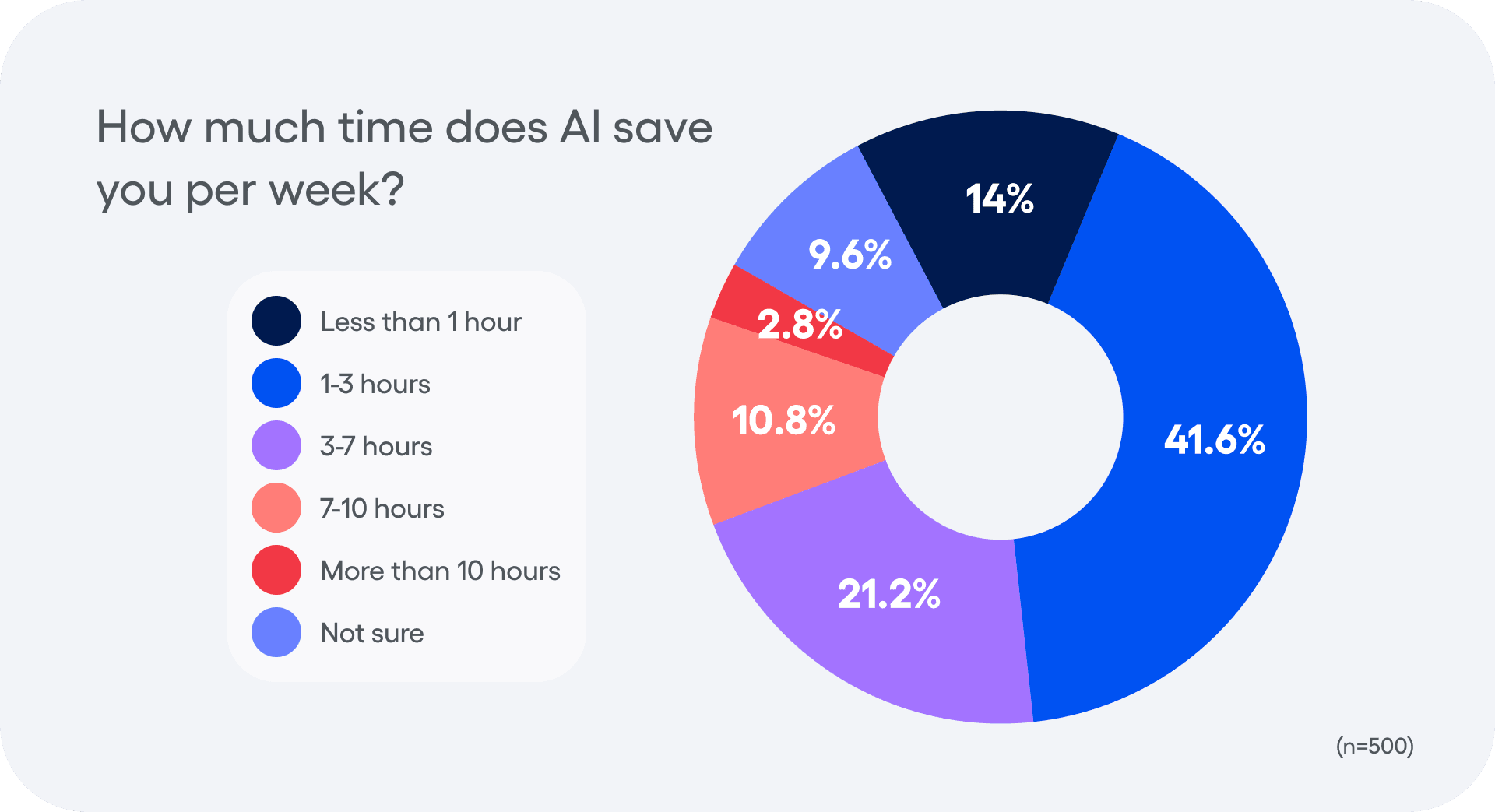
This efficiency gain also affects job satisfaction. Half of AI-using marketers said they are satisfied with the results of their work (50.8%), while among non-users, only 27.2% said the same.
When asked about the biggest changes felt from AI usage, 44.8% cited improved efficiency, 36.8% noted better quality and outcomes, and 30% said AI tools helped them generate more ideas—showing AI's role as a source of inspiration, not just outputs.
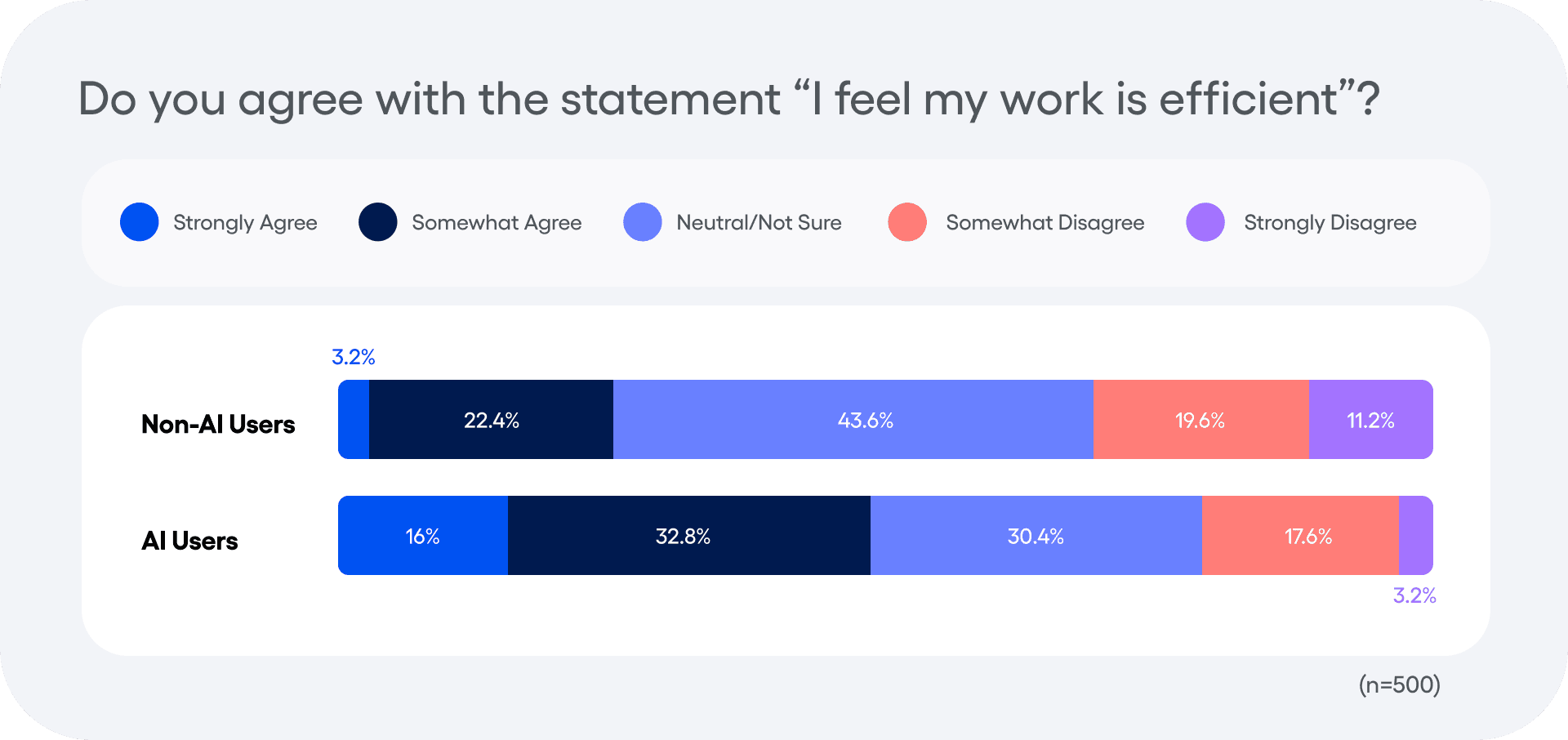
How are marketers using AI tools?
The most common marketing use cases for AI were research tasks like market studies and competitor analysis (36.4%), followed by data analysis (34%). Over half of users (136 people) cited ChatGPT as their most-used AI tool.
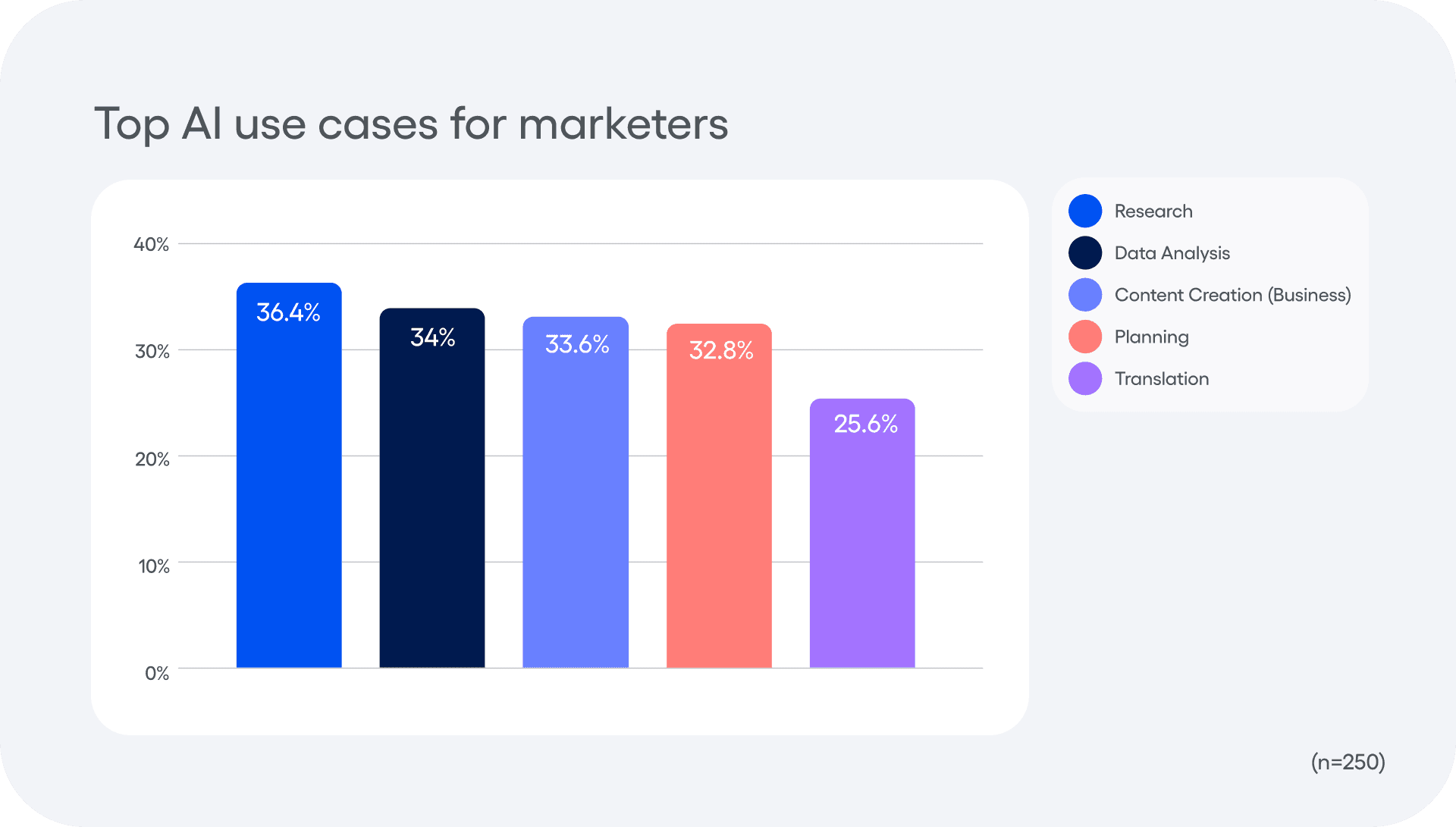
Meanwhile, non-users also reported that data analysis (17.6%) and research tasks (14.4%) were the most time-consuming parts of their work.
Looking ahead, 72% of AI users believe AI tools will become essential for most or all marketers, while only 28.8% of non-users agreed. Another 22.4% of non-users said AI tools “will remain optional.” For those already actively using generative AI, however, the perception is shifting toward AI as a necessity rather than a choice.
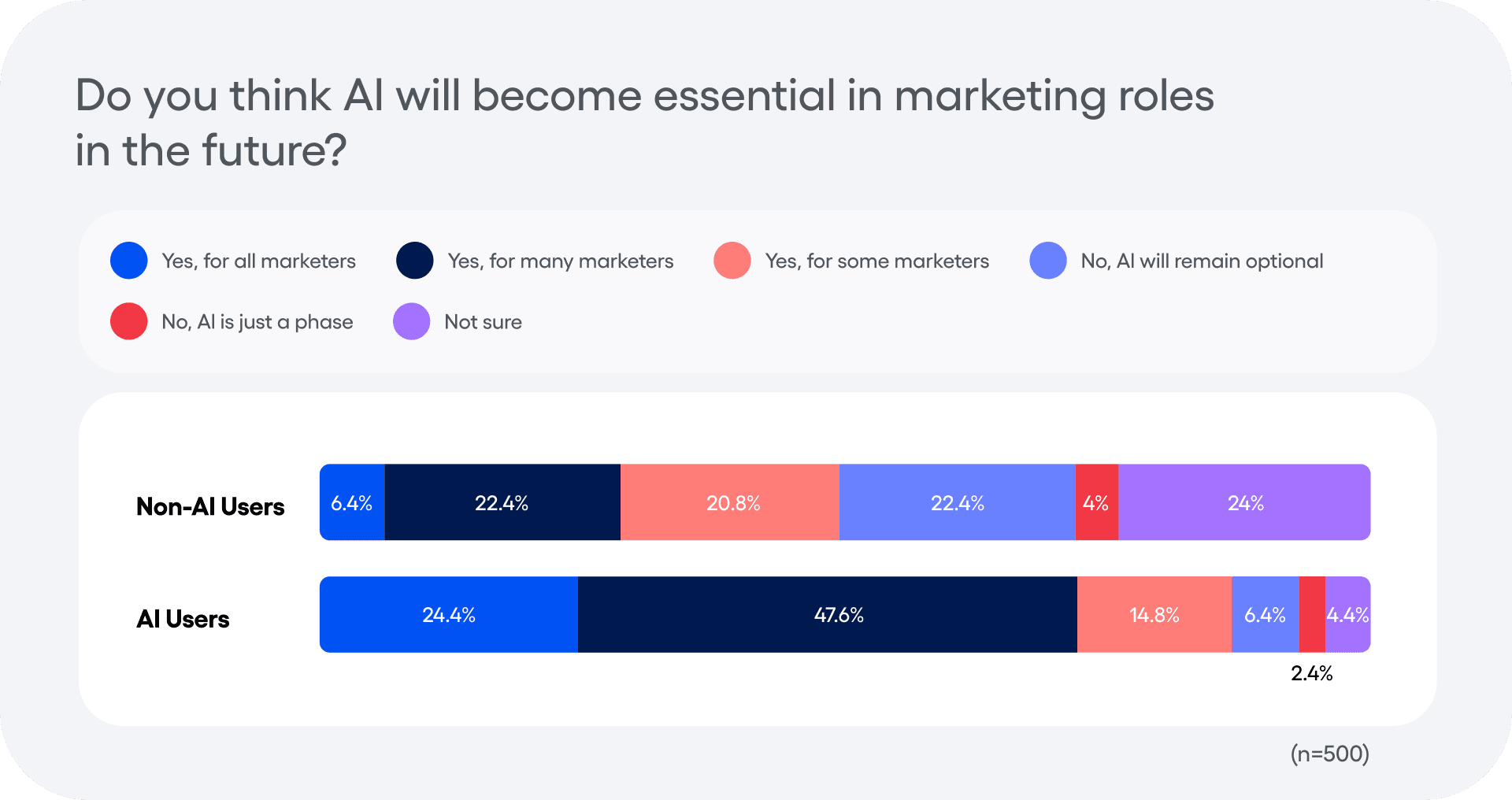
What do marketers think of AI tools?
AI users clearly view AI as important in their day-to-day work. When asked about their perception of generative AI and AI agents, about 40% described them as “powerful partners for business improvement,” not just tools for efficiency.
Many marketers also believe AI has a positive impact at the team level. 31.6% said AI improves overall team performance, while 26.8% said it helps close performance gaps between team members. More than half of AI users felt positive team-wide effects.
AI is also reshaping perceptions of personal market value and income. Among AI users, 55.2% think generative AI is useful for career development. In fact, over 139 respondents (more than half of AI users) said they used AI tools in more than 40% of the work where they achieved their biggest results in the past year—suggesting AI plays a role in enhancing individual capabilities.
Long-term, this will translate into increased career opportunities. 70% of AI users believe the market value of marketers who cannot use AI tools will decline in the future. This shows that AI is already being recognized as a critical factor for long-term career growth. By contrast, only 40.8% of non-AI users said the same, highlighting a clear gap in perception.
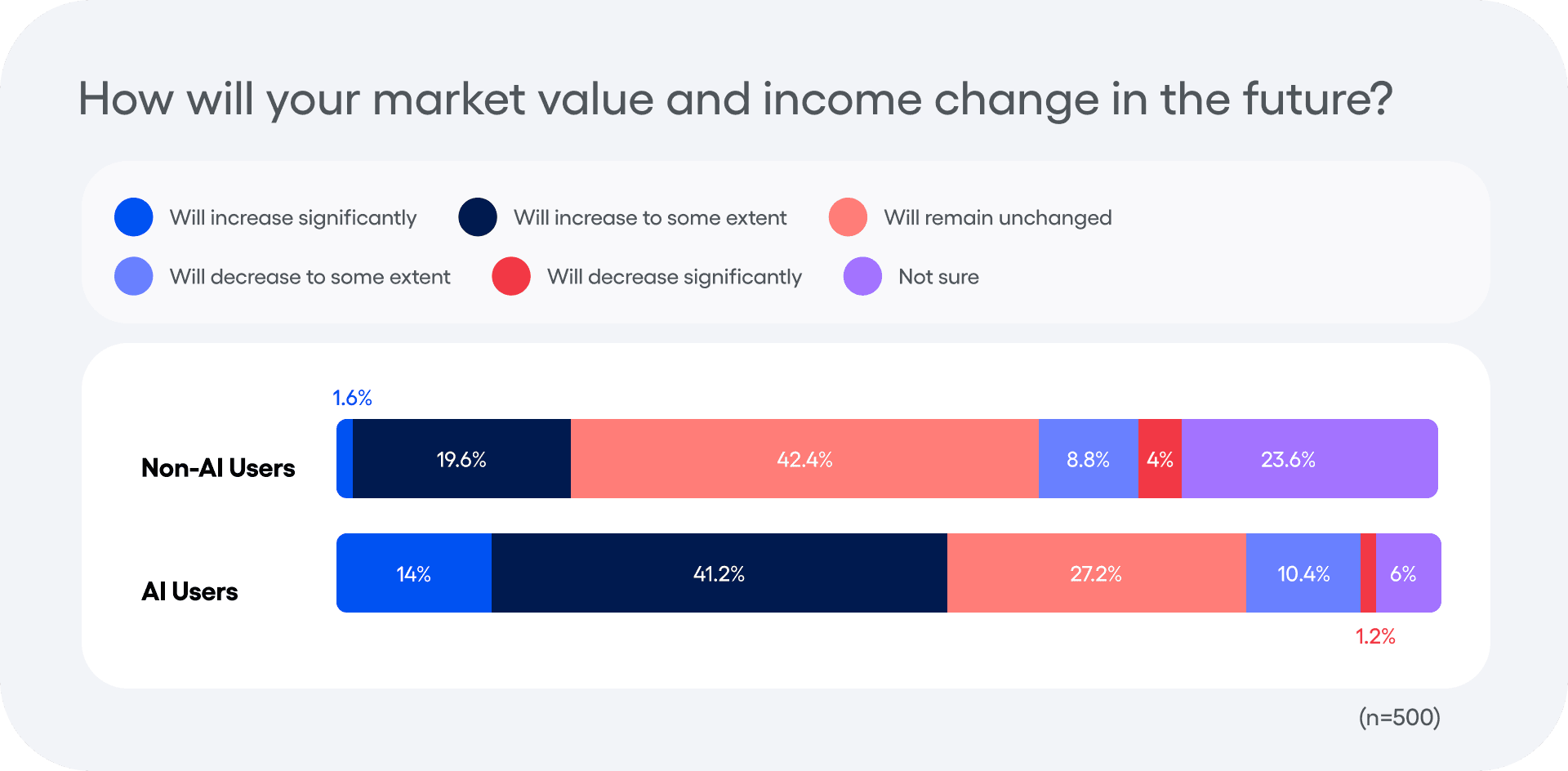
What risks come with AI adoption?
When asked what conditions would encourage them to start using AI, about 20% of non-users said they would do so if their company explicitly instructed or recommended it. Of non-AI users, 29.6% said neither their colleagues nor team members are using AI, suggesting that even in the marketing field, many organizations still lack a clear policy on AI adoption.
Concerns about AI use were similar between users and non-users. The biggest concern for both groups was information leakage and security risks (AI users: 26%, non-users: 18.8%). The second most common concern was copyright and ethical issues (AI users: 16%, non-users: 10%). These results suggest that creating secure environments and clear rules is essential to encouraging broader adoption.
When asked about entrusting AI with marketing campaigns, only 9.6% of AI users and 2.4% of non-users said they would feel comfortable handing over full control. However, a much larger share—55.2% of AI users and 28.8% of non-users—said they would be open to using AI in this way if there were review or oversight mechanisms in place. In other words, while complete trust in AI tools hasn’t been established, many marketers see potential for practical integration as long as proper safeguards are ensured.
Turning AI into a competitive edge
This study shows that marketers who use AI tools not only see tangible gains in efficiency and results but also feel more confident about their own market value.
Beyond surface-level effects like time savings and higher satisfaction, AI is increasingly being recognized as a must-have tool and powerful partner, reshaping attitudes toward new technology. This shift is also creating differences in outlook: many AI users believe that AI-driven improvements will eventually translate into higher market value and income, while non-users do not share the same view.
At Amplitude, we've seen the value of AI firsthand, both internally and with customers. For example, it used to take Amplitude about a month to optimize a website conversion workflow, from idea generation and experimentation to engineering and launch. With an Amplitude AI Agent, the same workflow now takes less than one day. This is a huge time saver for our marketing team.
While the number of AI tools on the market can be overwhelming, our recommendation is to experiment. Encourage your employees to test different options, see what has an impact, and then invest more. The AI landscape is moving too fast for long-term planning, but the benefits are too good to pass up.

Kaori Nieda
Country Manager for Japan, Amplitude
Kaori Nieda is the Country Manager for Japan at Amplitude. With more than 30 years of experience, Nieda leads the strategy and execution of Amplitude's growing business in Japan.
More from KaoriRecommended Reading

Amplitude’s All-Star Weekend with the NBA Foundation: A Recap
Feb 26, 2026
5 min read

Amplitude Pathfinder: How Zach Phillips went from “IT Guy” to Analytics Leader
Feb 25, 2026
12 min read

Amplitude + Lovable: Launch, Learn, Repeat
Feb 23, 2026
3 min read

Amplitude + Figma: Make What Matters
Feb 20, 2026
4 min read

